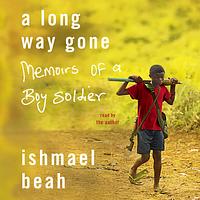Take a photo of a barcode or cover
It ended a bit too early. I know he ended up okay eventually because I can look up his Wikipedia page but the book ended too early.
How did he get out of Guinea?? How did Laura (I think that was her name) end up becoming his "aunt"? How did he get into the United States? Did he have issues getting a long term visa? Seems so odd to allude to him living with Laura in New York but then end the book when he was still unsafe and stranded in Guinea. I had to go back and make sure I didn't accidentally miss a chapter.
How did he get out of Guinea?? How did Laura (I think that was her name) end up becoming his "aunt"? How did he get into the United States? Did he have issues getting a long term visa? Seems so odd to allude to him living with Laura in New York but then end the book when he was still unsafe and stranded in Guinea. I had to go back and make sure I didn't accidentally miss a chapter.
Read this last summer. Appalling, horrifying, but ultimately uplifting and life-affirming.
If you are considering reading this, please take heed. This is a truly graphic and horrifying read. This was one of my 22 books to read in 2022 selections, so chosen because it fulfilled my criteria for the reading around the world challenge: Africa: Sierra Leone, and quite honestly I wish I had selected something else.
Leading with the WIDL today because I believe it is more important than the WIL.
WIDL
1) Reviewer Steven Steven said it best in his review "This book is disturbing. It's a good read, but I cannot in good conscience recommend it to anyone who has trouble sleeping; this...[won't] help at all." I don't know what I expected really. Going in, I had assumed it would be decently disturbing, but I underestimated just how much it would bother me. This book is extremely graphic. It leaves very little to the imagination. I became physically ill from reading it. It made sleeping a difficult and dreaded affair. I reiterate Steven's wisdom: I cannot in good conscience recommend this to anyone who has trouble sleeping. I would further expand that and say that I cannot recommend this to anyone who is in recovery from mental health complications, anyone who is particularly empathetic, or anyone who believes themselves capable of suffering second-hand trauma from sharp descriptions of horrors that first world country inhabitants can scarcely fathom.
2) When it rains it pours, when it's dry, it's drought. The visuals and descriptions were either entirely too horrifying and nightmarish OR dull and dry. Maybe the dull/dry parts just seemed that way in contrast to the horrors all around them, but I felt I was grappling for a consistent tonal foothold the entire way through this.
3) rave reviews. I selected this for my Sierra Leone read because it was so well-regarded by so many fellow reading around the world participants. To that I say: are you guys okay??? Do your respective therapists know about your experience with this book?
WIL
1) the only reason this is not a 0-1 star read is because it is so brutally, remarkably candid. The author refuses to hide behind shame or disguise his words with any fancy literary techniques. It is just 100% a story of a life of horrors and victories and the pursuit of happiness in dire circumstances. That's not a frequent writing approach nowadays, and it was refreshing in its own way. Credit to Beah for owning his story fully. The inherent courage in this writing is nothing short of brilliant.
NEUTRAL GROUND
1) if you've read this far, you might be asking yourself why I didn't simply DNF if it was such a brutal read. And here's the thing, I did! I did DNF for a while. The reading dates here only represent my latest attempt to try this again which I only TRIED because I was told he goes to REHAB and it's HELPFUL for both protagonist AND reader. I assumed that if I could get through the worst of it and see that the protagonist came out the other side well enough, then,, I dunno, I'd be able to deal with it better. This is not an approach I recommend! If you're struggling with this early on, be smarter than me. Just dnf.
Leading with the WIDL today because I believe it is more important than the WIL.
WIDL
1) Reviewer Steven Steven said it best in his review "This book is disturbing. It's a good read, but I cannot in good conscience recommend it to anyone who has trouble sleeping; this...[won't] help at all." I don't know what I expected really. Going in, I had assumed it would be decently disturbing, but I underestimated just how much it would bother me. This book is extremely graphic. It leaves very little to the imagination. I became physically ill from reading it. It made sleeping a difficult and dreaded affair. I reiterate Steven's wisdom: I cannot in good conscience recommend this to anyone who has trouble sleeping. I would further expand that and say that I cannot recommend this to anyone who is in recovery from mental health complications, anyone who is particularly empathetic, or anyone who believes themselves capable of suffering second-hand trauma from sharp descriptions of horrors that first world country inhabitants can scarcely fathom.
2) When it rains it pours, when it's dry, it's drought. The visuals and descriptions were either entirely too horrifying and nightmarish OR dull and dry. Maybe the dull/dry parts just seemed that way in contrast to the horrors all around them, but I felt I was grappling for a consistent tonal foothold the entire way through this.
3) rave reviews. I selected this for my Sierra Leone read because it was so well-regarded by so many fellow reading around the world participants. To that I say: are you guys okay??? Do your respective therapists know about your experience with this book?
WIL
1) the only reason this is not a 0-1 star read is because it is so brutally, remarkably candid. The author refuses to hide behind shame or disguise his words with any fancy literary techniques. It is just 100% a story of a life of horrors and victories and the pursuit of happiness in dire circumstances. That's not a frequent writing approach nowadays, and it was refreshing in its own way. Credit to Beah for owning his story fully. The inherent courage in this writing is nothing short of brilliant.
NEUTRAL GROUND
1) if you've read this far, you might be asking yourself why I didn't simply DNF if it was such a brutal read. And here's the thing, I did! I did DNF for a while. The reading dates here only represent my latest attempt to try this again which I only TRIED because I was told he goes to REHAB and it's HELPFUL for both protagonist AND reader. I assumed that if I could get through the worst of it and see that the protagonist came out the other side well enough, then,, I dunno, I'd be able to deal with it better. This is not an approach I recommend! If you're struggling with this early on, be smarter than me. Just dnf.
Absolutely eye-opening non-fiction narrative. I picked it up because I saw Beah speak and he was absolutely riveting. The book is just as riveting.
I am still processing this book, but it managed to leave me both hopeful and despairing as it came to the end. Such an intense and personal story to be shared, and while horrific, it wasn't gratuitously violent (that's not to say it wasn't violent and terrible, because it absolutely was, but not in a way that felt like done to shock the reader into feeling something... there was no need for that).
My rating of 4 stars is simply because parts felt they could have been expanded, I sometimes would go back and check if I'd accidentally tapped ahead a few pages or such.
My rating of 4 stars is simply because parts felt they could have been expanded, I sometimes would go back and check if I'd accidentally tapped ahead a few pages or such.
I had to stop reading this book several times because what Beah and other young men like him had to endure in surviving in his country sieged by war is unthinkable. This book should be something everyone should read simply for the fact that growing up isn't always bells and whistles. What has been stolen from Beah, his family, his childhood can't be replaced. But what he has done in penning this memoir is to allow us to see what he loss, "everything that meant something" to him, everything that means something to each one of us. I'm embarrassed with my lack of awareness, the audacity we have as citizens of other places to forget what life has been like for others. We could easily get stuck in the mindset that the place we live has so many problems but can we expand our compassion and sympathy to realize the WHOLE race of mankind in all corners of the world have lived something as terrifying as being a child solider. In no way should we minimize or demean the lives of others.
It's a shame it's taken me this long to read this book. I don't think I could ever forget Beah's story and I hope anytime I'm tempted to, I'll be reminded of how much so many have endured.
It's a shame it's taken me this long to read this book. I don't think I could ever forget Beah's story and I hope anytime I'm tempted to, I'll be reminded of how much so many have endured.
A Long Way Gone is an amazing book on many levels. First, the story that Ishmael Beah tells is an emotional one and one that is staying with me now that I have finished reading. He tells of his teenage years, first as a child soldier in the midst of horrific warfare, and then as he was rehabilitated and began his path to his adult life in the US today. Secondly, Beah has an incredible voice as an author. I was struck many times by the sheer beauty of the way he put words together. He was able to bring humor to his story, too, as he described his first journey to New York City in the winter and seeing snow for the first time. Last but not least, I was reminded of the power of forgiveness. I wonder if we could apply more of this philosophy of rehabilitation in the US. We accept these young people into the US and elsewhere because as children they were exposed to violence and kept drugged so that they could survive and so that they would follow the orders of the drug lords. Once they have been rehabilitated, they are considered valuable members of society and can pursue their lives as Beah has done and rightfully so. I'm not sure we always give our own teens who have been "jumped in" to gangs at an early age or forced to live homeless the rehabilitation and then the respect they are due. Why are we so eager to incarcerate our own young people instead of redeeming them and helping them become part of our society? Why do we think that just growing up and getting a job will solve the problems of the emotionally devastated? Why are those that help often labeled "enablers" instead of celebrated with pride? Why are we so afraid of our own teens that we feel we need to "stand our ground" against them? These are questions I am still pondering after reading this meaningful memoir, A Long Way Gone.
Ishmael's story is a tale of heartbreak and turmoil, but also of incredible resilience. I found myself unable to put it down. My one complaint is that I thought it ended too soon, and I wanted more about his final journey to the U.S.
Such an impactful, incredible work, albeit life of survival and deep, deep pain. Should be mandatory reading everywhere m.
challenging
dark
emotional
sad
tense
fast-paced
What an eye opening book. Not a pleasant read, but one that everyone should read I believe. Ishmael was 12 years old when war came to his village. By the time he was 13 he was a child soldier. Horrifying the violence witnessed by this child and amazing that he survived and was now is a spokesperson to help show the world the horrors of war and the despicable way we treat fellow humans. This book touched me deeply.





